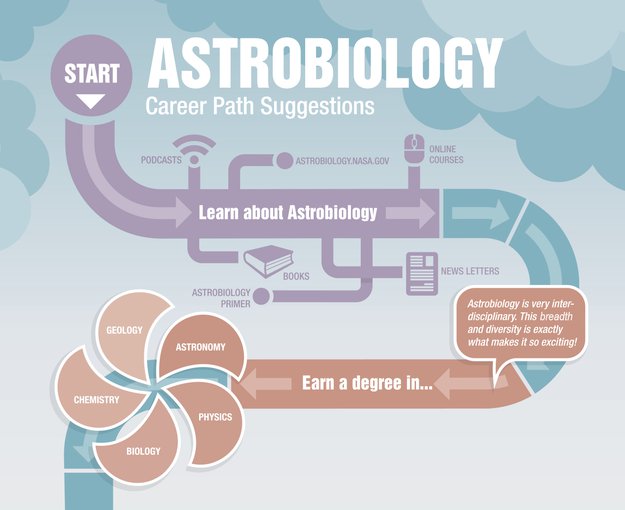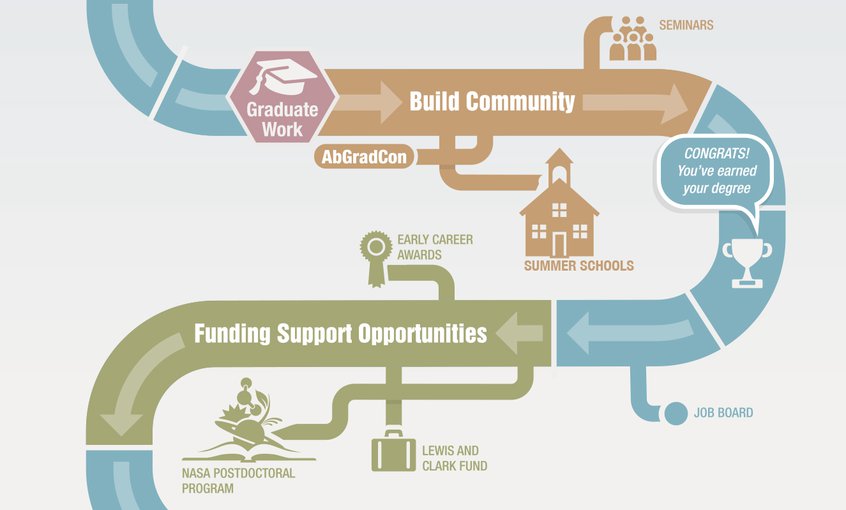how to become an astrobiologist
Astrobiology is the study of the origins, evolution, distribution, and future of life in the universe. This interdisciplinary field requires a comprehensive, integrated understanding of biological, planetary, and cosmic phenomena. Astrobiology encompasses the search for habitable environments in our Solar System and on planets around other stars; the search for evidence of prebiotic chemistry or life on Solar System bodies like Mars, Jupiter's moon Europa, and Saturn's moon Titan; and research into the origins, early evolution, and diversity of life on Earth.
The field of astrobiology is relatively new when compared to the long established fields of astronomy, biology, physics, geology, planetary science, etc. At this time, there are very few dedicated degree programs in astrobiology. The typical pathway for a student interested in pursuing astrobiology graduate studies is to specialize in a single scientific discipline. You should choose a field that really excites you. This discipline will be the base of knowledge that you will build upon, so make it one you are passionate about.

Undergraduate Studies
As you work on building a foundation in your field of interest, educate yourself about astrobiology. There are many good online courses you can take. The Astrobiology Primer is a good reference tool to understand, at least at a fundamental level, the field of astrobiology. You can browse this NASA Astrobiology Program website for the latest information on astrobiology careers, education, funding, news, and publications. You should sign up to receive the Astrobiology Newsletter to keep current on astrobiology happenings.
Undergraduate Opportunities: There are many NASA summer programs, scholarships, and special programs available to undergraduates.

Graduate Studies:
When looking for graduate schools, look at research topics of individual scientists involved in the part of astrobiology you are interested in, and focus your graduate applications towards working with those individuals.
A good place to start your search is by looking at the research projects within the NASA Astrobiology Program as well as the NASA Astrobiology Institute Teams and Annual Reports.
You should also be networking and engaging with your astrobiology community. Attend the Astrobiology Graduate Conference (AbGradCon) and participate in astrobiology summer schools
Graduate Opportunities: There are many NASA summer programs, scholarships, and special programs available to graduate level students.
Postdoctoral Work:
Currently, PhD's are not awarded solely in astrobiology. As you look towards your postdoctoral work you will want to identify a research group involved in the research you are interested in, whether that's searching for exoplanets or understanding microbes in extreme environments. Again, you can look through NASA Astrobiology Program research projects, NASA Astrobiology Institute Teams and Annual Reports. You should read recently published papers from the group you're interested in and visit their website to gain an appreciation for what they do and how that fits with your interests. Then contact the Principal Investigator (PI) to see if they have Ph.D. positions available.
You should also visit our job board regularly for postdoctoral postings. You can also look through a list of NASA fellowships and opportunities.

Now You're An Astrobiologist!
There is a wide range of jobs available to astrobiologists besides doing research in a lab or lecturing at a university. You can work in the press office informing the media on the latest happenings; or as a science journalist writing about the latest discoveries in websites, magazines, newspapers, or books. Are you also an artist? you can develop educational materials like the Astrobiology Graphic Histories. Or get into science policy making sure the government makes well-informed decisions about new laws or funding; or work in project management or administration. Where do you want to contribute, what's your path?
how to become an astrobiologist
Source: https://astrobiology.nasa.gov/career-path-suggestions/
Posted by: hillhadoestabut.blogspot.com

0 Response to "how to become an astrobiologist"
Post a Comment